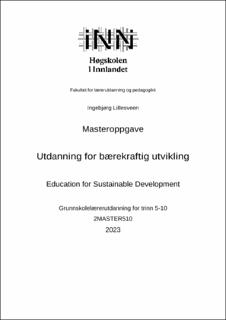Utdanning for Bærekraftig Utvikling
Master thesis
Permanent lenke
https://hdl.handle.net/11250/3080908Utgivelsesdato
2023Metadata
Vis full innførselSamlinger
Sammendrag
Sammendrag
Temaet for denne masteroppgaven er utdanning for bærekraftig utvikling, og problemstillingen som belyses er: «Hvordan forstår samfunnsfaglærere utdanning for bærekraftig utvikling og hvordan underviser de i dette temaet i klasserommet?». Gjennom tre forskningsspørsmål skal jeg se på hvordan lærere forstår begrepet, hvordan de hjelper elever med å utvikle sitt miljømedborgerskap og om Fagfornyelsen fra 2020 har endret synet deres på begrepet og undervisningen.
Bærekraftig utvikling er et tema som stadig får mer oppmerksomhet i det offentlige diskusjonen, og bærekraftsutfordringene er blant de viktigste og mest utfordrende å løse for å sikre en fremtid for liv på jorda. Temaet satte sitt preg på fornyelsen av læreplaner som trådte i kraft høsten 2020, hvor bærekraftig utvikling ble ett av tre tverrfaglige temaer. Teorigrunnlaget for oppgaven handler om hvordan bærekraftig utvikling belyses i den forrige læreplanen og i den nye. Videre fokuseres det på hva som legges i utdanning for bærekraftig utvikling, og hvilke kompetanser og områder fagfeltet mener er sentrale innenfor denne sammenhengen. I denne oppgaven vil Sinnes’ fire tilnærminger til undervisning for bærekraftig utvikling være sentrale (Sinnes, 2015). I tillegg vil det sees på særlig handlingskompetanse og kritisk tenking.
For å kunne belyse problemstillingen til denne oppgaven har jeg intervjuet fem samfunnsfaglærere, og oppgaven vil derfor ha en kvalitativ tilnærming. Eksempelvis stilte jeg spørsmål knyttet til hvordan de underviser i temaet, hvordan den nye læreplanen har forandret deres syn på utdanning for bærekraftig utvikling og om de kjente på noen utfordringer knyttet til dette temaet.
Resultatene av studien viser at lærere forstår begrepet svært ulikt og vektlegger dermed undervisningen ulikt. Lærerne beskriver flere utfordringer knyttet til å undervise i bærekraftig utvikling og hvordan engasjere elevene. I tillegg kommer det fram at Fagfornyelsen ikke har endret undervisningspraksisen eller lærernes syn på bærekraftig utvikling i særlig stor grad. Abstract
The topic of this master’s thesis is Education for Sustainable Development, and the research question is: “How do social studies teachers understand Education for Sustainable development and how do they teach this topic in the classroom?”. I will look at how teachers understand the term, how they help pupils to develop their environmental citizenship and whether the new curriculum from 2020 has changed their view of the term and teaching.
Sustainable development is a topic that is constantly receiving more attention in the public discussion, and sustainability challenges are among the most important and challenging to solve in order to secure a future for life on earth. The theme lefts its mark on the renewal of curricula that came into effect in autumn 2020, where sustainable development became one of three interdisciplinary topics. The theoretical basis for the thesis is about how sustainable development is highlighted in the previous curriculum and in the new one. Further, the focus is on what is included in Education for Sustainable Development, and which competences and areas the field believes are central within this context. In this thesis, Sinnes’ four approaches to teaching for sustainable development will be central (Sinnes, 2015). In addition, action competence and critical thinking will be looked at.
In order to shed light on the issue for this theses, I have interviewed five social studies teachers, and the thesis will therefore have a qualitative approach. For example, I asked questions related to how they teach the topic, how the new curriculum has changed their view of Education for Sustainable Development and whether they were aware of any challenges related to this topic.
The results of the study shows that teachers understand the term very differently. The teachers describe several challenges related to teaching sustainable development and how to engage the students. In addition, it appears that the subject reform has not changed the teaching practice or the teachers’ views of sustainable development to a particularly large extent.
